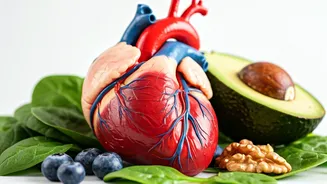Oats: Heart's Best Friend
Oats are a nutritional powerhouse, brimming with soluble fiber, specifically beta-glucan. This type of fiber works wonders by lowering LDL cholesterol,
often called 'bad' cholesterol, which is a significant contributor to heart blockages. As cholesterol levels decrease, the risk of plaque buildup in arteries diminishes, fostering improved blood flow. Including oats in your diet is simple; a bowl of oatmeal for breakfast, prepared with water or low-fat milk, can kickstart your day with a heart-healthy boost. Another option is incorporating oats into smoothies or using them as a base for homemade granola. Regularly consuming oats is a proactive measure to shield your heart and maintain cardiovascular health. This versatile grain is not only good for the heart but also keeps you feeling full, helping in weight management, which in turn benefits your heart.
Fatty Fish: Omega-3 Power
Fatty fish, such as salmon, mackerel, and sardines, are excellent sources of omega-3 fatty acids, which play a crucial role in reducing heart blockages and repairing blood vessels. Omega-3s possess potent anti-inflammatory properties, mitigating the inflammation that can damage blood vessel walls. They also help lower triglycerides, a type of fat found in the blood that, when elevated, increases the risk of heart disease. Furthermore, these essential fats can help stabilize heart rhythms, lowering the chance of sudden cardiac events. Aim to include fatty fish in your diet at least twice a week. You can grill, bake, or pan-fry them. For those who do not prefer fish, consider fish oil supplements, but always consult with a healthcare professional before starting any new supplement regimen.
Berries: Antioxidant Richness
Berries, including strawberries, blueberries, raspberries, and blackberries, are packed with antioxidants, which are vital for heart health. These compounds fight against free radicals that can cause cellular damage and contribute to the buildup of plaque in arteries. The antioxidants in berries, specifically anthocyanins, have been shown to improve blood vessel function and reduce blood pressure. Consuming berries regularly can improve your heart’s functionality, enhance blood flow, and reduce overall cardiovascular risk. They are a delightful and effortless addition to any diet. Add them to your morning cereal, blend them into smoothies, or enjoy them as a refreshing snack. Fresh, frozen, or even dried berries are all nutritious options, making it simple to incorporate them into your daily routine.
Nuts and Seeds: Healthy Fats
Nuts and seeds, such as almonds, walnuts, flaxseeds, and chia seeds, are packed with healthy fats, fiber, and various minerals that are beneficial for heart health. These foods can help reduce LDL cholesterol levels and provide anti-inflammatory effects. The monounsaturated and polyunsaturated fats found in nuts and seeds support blood vessel health and promote better overall cardiovascular function. Incorporating a handful of nuts or seeds into your daily diet is an easy way to boost your heart's health. You can sprinkle them on salads, add them to yogurt, or consume them as a snack. However, portion control is key, as nuts and seeds are calorie-dense. A small serving of approximately one-quarter cup per day is generally recommended to obtain the benefits without excessive caloric intake.
Leafy Greens: Nutrient Boost
Leafy green vegetables like spinach, kale, and collard greens are filled with vitamins, minerals, and antioxidants that are vital for heart health. They are particularly rich in vitamin K, which is essential for blood clotting and can prevent calcium buildup in arteries, thus reducing the risk of heart blockages. The fiber in these greens also aids in lowering cholesterol levels. Including leafy greens in your diet can support healthy blood pressure levels and improve blood vessel function. Incorporating leafy greens into your meals is easy. Add them to salads, saute them with a bit of olive oil, or blend them into smoothies. Aim to include a variety of these vegetables in your diet for a range of essential nutrients, helping you maintain a robust cardiovascular system and a healthier overall life.












